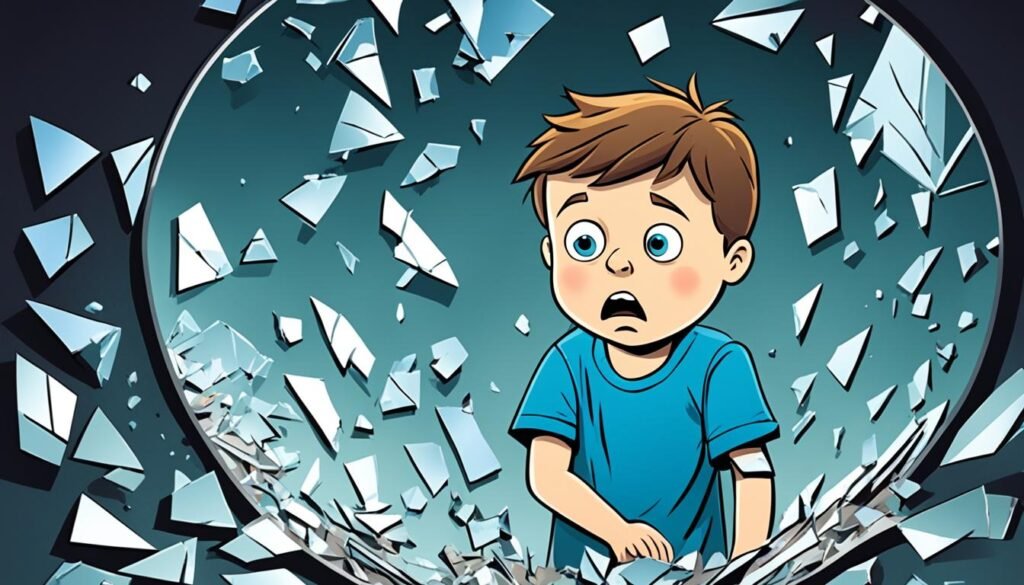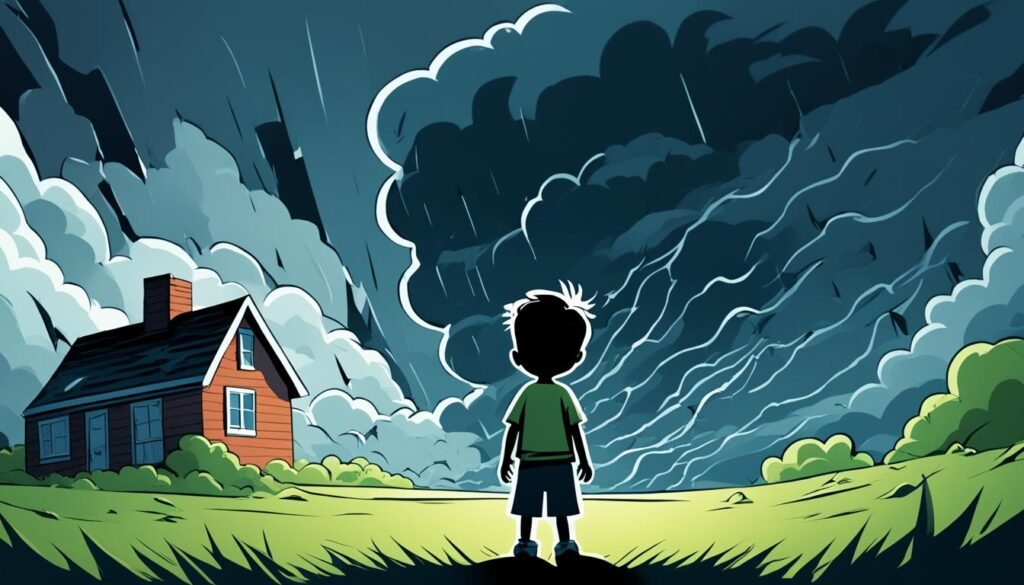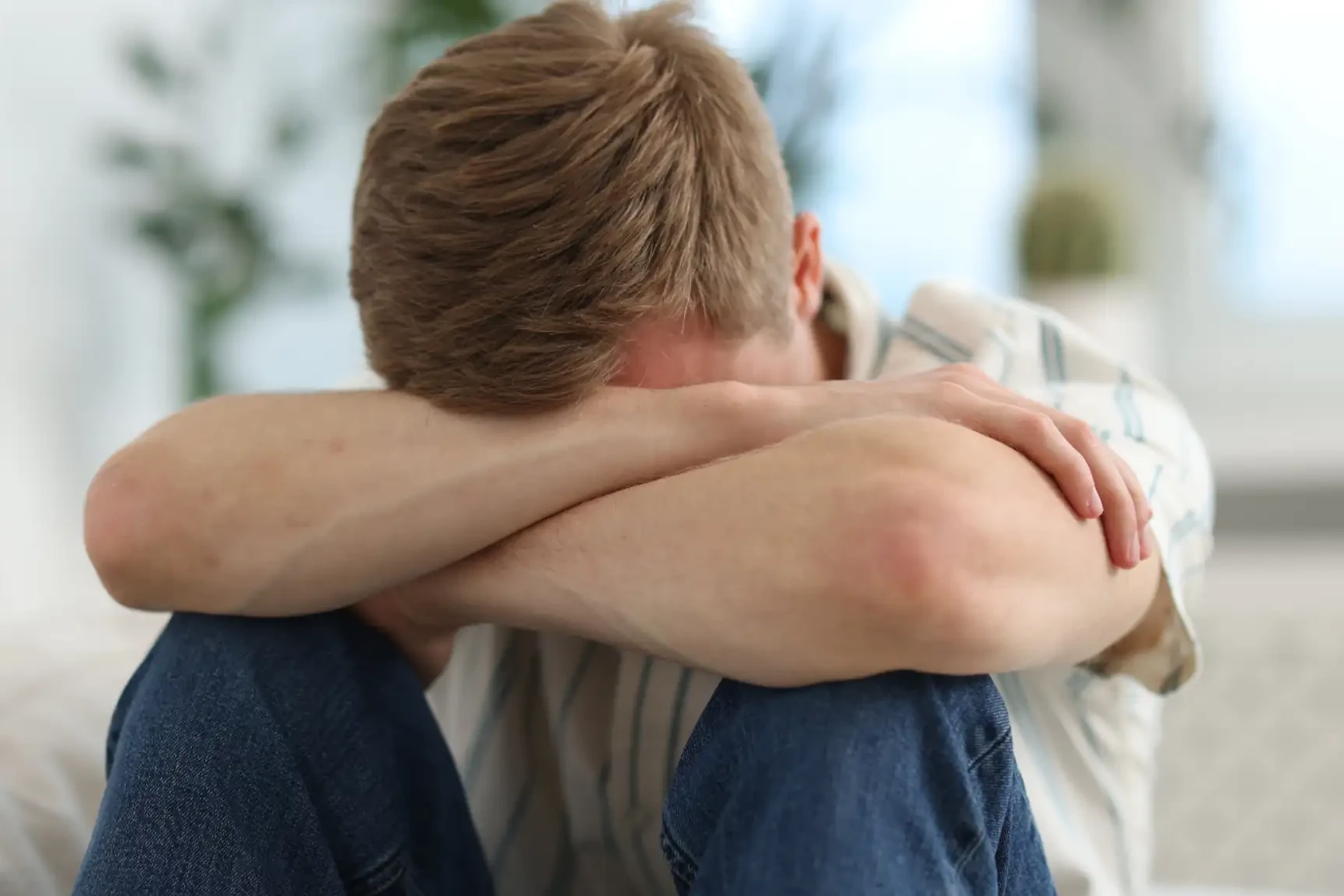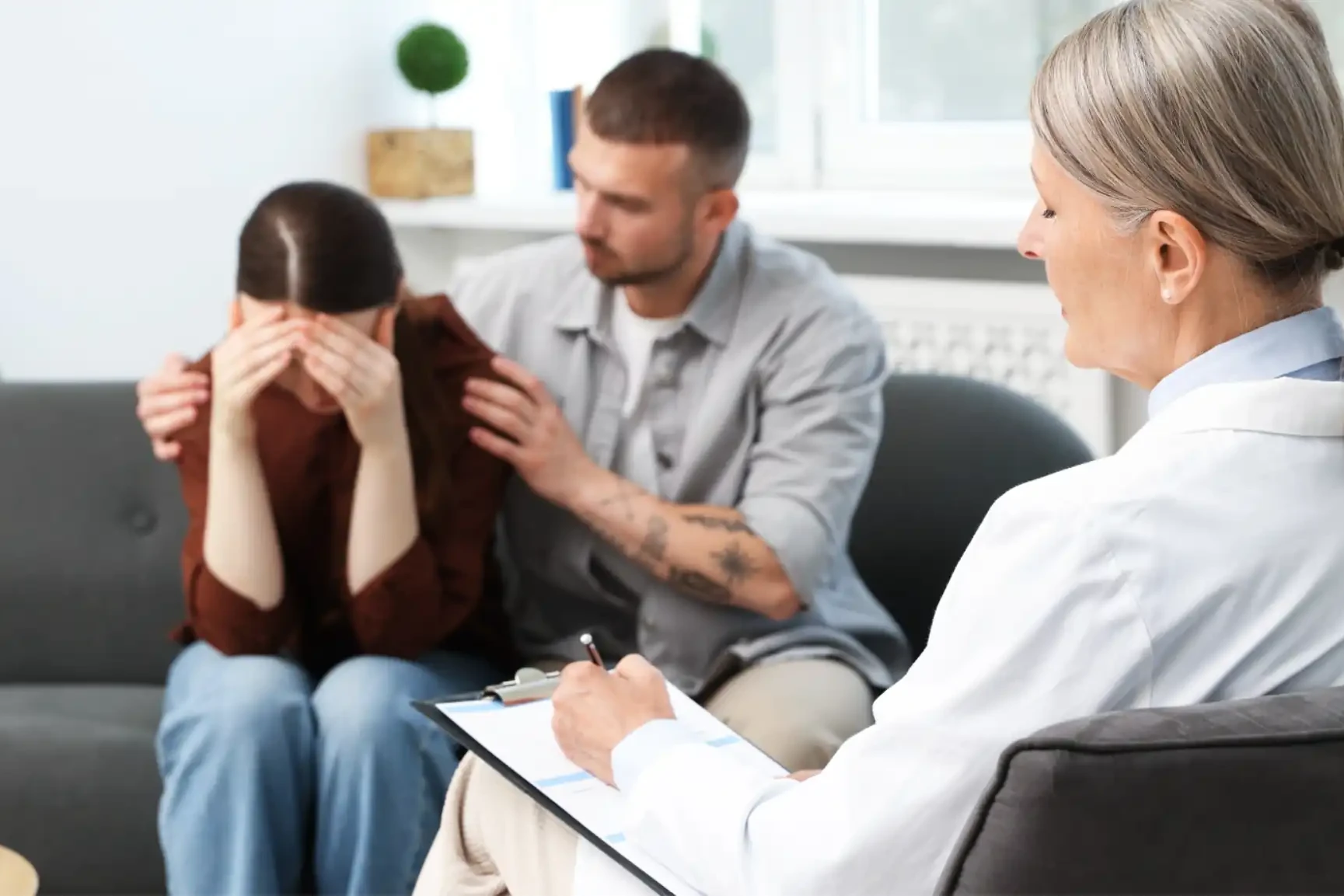Your experiences, both good and bad, deeply affect your mental health and well-being. The link between post-traumatic stress disorder (PTSD) and childhood trauma is strong. It’s key to know this to help survivors heal.
Trauma can change how you see the world and yourself. Its effects can be hidden or very clear, based on who you are and the event’s nature. The support you get also plays a big role.
Understanding trauma’s impact on your mental and emotional health is crucial. Knowing how PTSD and childhood trauma are linked helps you start healing. It’s a step towards getting back your strength and power.
Table of Contents
ToggleTrauma-Informed Care: Recognizing the Impact
Trauma-informed care is key to helping those who have gone through trauma. It means understanding how trauma affects people and how they might react. As a healthcare provider, knowing this is vital for helping patients with their mental health.
Sequence of Trauma Reactions
Right after a traumatic event, survivors face many challenges. Their reactions depend on their past, support systems, coping skills, and the community’s response. They might feel very tired, confused, sad, anxious, or even numb.
Common Experiences and Responses to Trauma
After a traumatic event, survivors often deal with ongoing symptoms like constant tiredness, trouble sleeping, nightmares, and anxiety. It’s important to know that most people who have been through trauma can bounce back. They often find ways to cope, with the support of others, to deal with the trauma’s effects.
Understanding how people react to trauma helps healthcare providers give better care. They can offer support that fits the needs of each person on their path to healing.
Emotional Turmoil: Navigating the Aftermath
Trauma deeply affects a person’s emotional health, leading to emotional ups and downs. These feelings can be hard to deal with, but knowing what’s happening can help survivors move forward.
Emotional Dysregulation
Survivors of trauma may find it hard to control their feelings, especially if they were young when it happened. They might struggle with feelings like anger, anxiety, sadness, and shame. Some might try to handle these feelings by using drugs or alcohol, but this only makes things worse.
Emotional Numbing
Many survivors of trauma use emotional numbing as a way to cope. This is when feelings get disconnected from thoughts, actions, and memories. It’s a way to protect oneself, but it can make it hard to feel emotions and have close relationships later on.
It’s important to understand emotional ups and downs and numbing to help those affected. By knowing these reactions, doctors and support groups can better help survivors deal with their trauma. This can lead to building emotional strength.
PTSD and childhood trauma: A Lifelong Connection
Childhood trauma deeply affects a person’s mental and physical health. As kids grow, their view of the world as safe or dangerous comes from their past. Traumatic events, like abuse, change how they see themselves and handle stress, lasting into adulthood.
Kids who go through trauma are more likely to get PTSD and other mental health issues like depression and anxiety. They might also face physical health problems later, such as heart disease and diabetes.
The connection between PTSD and childhood trauma is clear. Traumatic events in childhood affect how people feel and behave, making it hard to control emotions and stress. This can really lower their quality of life and overall health.

If you or someone close has faced childhood trauma, finding trauma-informed care is key. Working through these issues and learning new ways to cope can lessen trauma’s effects. It helps with mental and physical health.
Childhood Trauma: Shattering Innocence
Childhood should be a time of safety and security. Sadly, many young ones face trauma. Studies show that 46% of kids in the U.S. have gone through some kind of trauma. This can be physical or sexual abuse, seeing violence, losing someone close, or being bullied.
Prevalence and Types of Childhood Trauma
Childhood trauma takes many forms. It’s not just abuse or violence. Even seeing a loved one get sick or being exposed to violent media can hurt a child. Not all bad events are traumatic, but they can still deeply affect a child.
- Physical abuse
- Sexual abuse
- Emotional abuse
- Neglect
- Witnessing domestic violence
- Exposure to community violence
- Natural disasters or accidents
- Separation from or loss of a parent or caregiver
- Bullying or peer victimization
Knowing about childhood trauma helps us understand its effects. It’s key to supporting those who have been hurt.
Trauma’s Ripple Effect: Physical and Mental Health Consequences
Childhood trauma can deeply affect your health, both physical and mental, even as an adult. Studies show that traumatic events in childhood can harm your immune and nervous systems. This increases your risk of chronic diseases like asthma, heart disease, diabetes, and stroke later on.
Childhood trauma is linked to mental health problems, such as PTSD, depression, anxiety, and even suicidal thoughts. It can also make it hard to form healthy relationships, affecting your social and emotional life.
Trauma and Brain Development
Traumatic experiences in childhood can change how your brain develops. This trauma and chronic disease link is because the stress from trauma can alter how your brain handles information and emotions.
- These changes can make it hard to remember things, focus, and make decisions.
- Trauma can also affect the development of the prefrontal cortex, which controls impulses and emotions.
Understanding how childhood trauma affects your health is key to healing and moving forward. By seeing the link between childhood trauma and mental health, you can start to address the trauma’s impact. This helps you focus on your well-being.
Relationships Rewritten: The Impact on Interpersonal Bonds
Childhood trauma deeply affects how we form relationships later in life. The bond with our primary caregivers shapes our future relationships. It’s like setting the stage for how we connect with others.
Attachment Challenges
When trauma makes a child feel unsafe or untrusting, it can lead to attachment issues as an adult. Survivors may find it hard to open up or connect deeply with others. They might see partners as unreliable, always ready to be let down or abandoned.
This can make it tough for those who’ve been through trauma to build lasting relationships. They might struggle with communication and forming close bonds. It’s all because of the attachment issues from their past.

Knowing how childhood trauma affects our relationships is key to fixing these issues. With support and therapy, survivors can work through their attachment problems. They can then build the connections they want.
Trauma Untreated: The Perpetuating Cycle
Childhood trauma that goes untreated can have lasting effects into adulthood. Without the right care, people who have not dealt with their trauma may face more mental health problems. They might also engage in risky behaviors and struggle with controlling their impulses and solving problems.
Not dealing with trauma can lead to depression, substance abuse, and even crime. This cycle of trauma keeps going. People who haven’t overcome their past may find themselves in more traumatic situations. It’s important to get help early and have a full treatment plan to stop this cycle. This helps survivors take back their lives.
- Untreated childhood trauma can lead to long-term mental health consequences, including depression and substance abuse.
- Individuals with unresolved trauma may struggle with impulse control and problem-solving, increasing their risk of engaging in risky behaviors.
- The cycle of trauma can perpetuate as those with untreated trauma face the potential for further traumatic experiences.
- Accessing trauma-informed care and early intervention is essential to breaking the cycle and helping survivors heal.
Dealing with your trauma is hard, but it’s key to moving past it and getting your life back. With the right support and tools, you can start healing and build a better life. Remember, you’re not alone, and there’s always hope for a brighter future.
Support and Healing: Empowering Survivors
Recovering from childhood trauma is tough, but with support, survivors can heal. It’s key to get the right help and resources. Encouraging kids to share their feelings and making them feel safe is crucial.
Adults who faced trauma as kids need to feel safe and talk to mental health experts. Trauma-informed therapy like cognitive behavioral therapy helps process feelings and build coping skills.
Support from family, friends, or groups is also vital. Sharing stories with others who understand can make you feel less alone. It builds a strong community.
With the right support, survivors can beat the effects of trauma and take back their lives. Self-care, professional help, and a caring network are key to healing and empowerment.
You’re not alone in this journey. There are many resources and experts ready to help. With kindness, patience, and a focus on your well-being, you can find healing and strength.
Conclusion
The link between PTSD and childhood trauma shows how vital trauma-informed care is. It helps us see how traumatic events affect a person’s mental, physical, and social health. This knowledge lets healthcare workers give better support to those who have faced trauma.
Dealing with trauma’s effects is tough, but there’s hope. With the right trauma recovery resources and treatments, people can handle their feelings, form strong relationships, and move forward. Understanding PTSD and childhood trauma helps us aim for a future where past traumas don’t limit our potential.
Your strength and resilience are key to taking back your life, step by step. You’re not alone in this journey, and healing is possible. Use the support and resources around you to start the journey of reclaiming your power and finding your way to wholeness.
FAQ
What is the impact of trauma on an individual’s beliefs and expectations?
Trauma can change how people see the future. It can make them lose hope and expect bad things. They might think they won’t live long or that normal life events won’t happen.
What are common reactions to trauma?
People often feel tired, confused, sad, and anxious after trauma. They might feel numb, disconnected, or very alert. Some may have trouble sleeping, nightmares, or feel sad and avoid things.
How can trauma impact emotional regulation?
Trauma can make it hard to control emotions, especially for those who experienced it young. People might struggle with feelings like anger, anxiety, and sadness. They might use drugs to feel better, which makes things worse.
What are the effects of childhood trauma?
Childhood trauma can affect a person’s mental and physical health for life. Events like abuse can shape a child’s personality and how they cope with problems. This can lead to mental health issues like PTSD, depression, and addiction later on.
It can also cause physical health problems, like heart disease, diabetes, and cancer, later in life.
How common is childhood trauma?
Childhood trauma is very common, with about 46% of kids going through it. Traumatic events can include abuse, seeing violence, natural disasters, losing someone close, or being bullied.
How does childhood trauma impact relationships and attachment?
A child’s relationship with caregivers is key to their emotional and physical health. Trauma can make it hard for them to trust or rely on others. This can affect their relationships as adults, making it hard to form close bonds.
They might struggle with trust, being open, and seeing their partner as a support. This can lead to problems in forming satisfying relationships.
What are the consequences of untreated childhood trauma?
Untreated childhood trauma can lead to ongoing problems. Kids may face depression, risky behaviors, and trouble controlling impulses. They might struggle with solving problems and thinking clearly.
It can also lead to mental health issues like substance abuse and increase the chance of becoming involved in crime.
What support and resources are available for survivors of childhood trauma?
Social support and professional help are key in reducing trauma’s effects. Encouraging kids to talk about their feelings and reassuring them can help. They might need therapies like cognitive behavioral therapy or family therapy.
Adults can find healing by feeling safe, talking to mental health professionals, and practicing relaxation techniques.
Source Links
About The Author

Medically reviewed by Dr. Chandril Chugh, MD, DM (Neurology)
Dr. Chandril Chugh is a U.S.-trained, board-certified neurologist with expertise in diagnosing and managing neurological disorders, including migraines, epilepsy, Parkinson’s disease, and movement disorders. His clinical focus includes evidence-based neurological care and patient education.
All content is reviewed for medical accuracy and aligned with current neurological guidelines.




